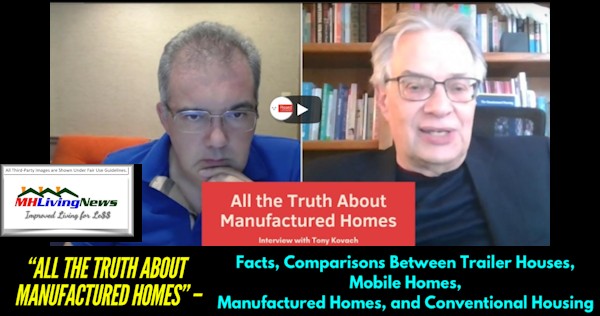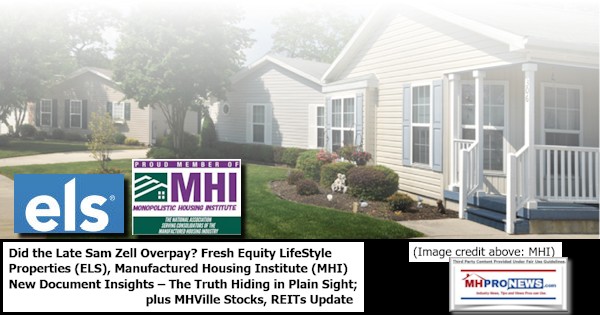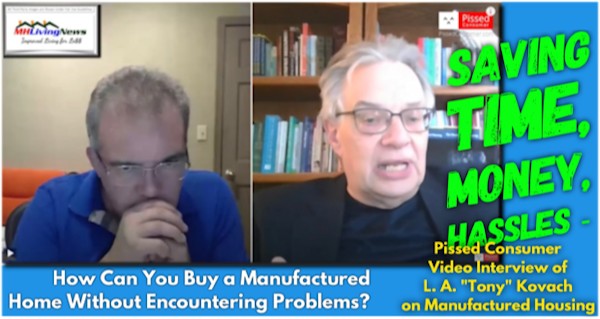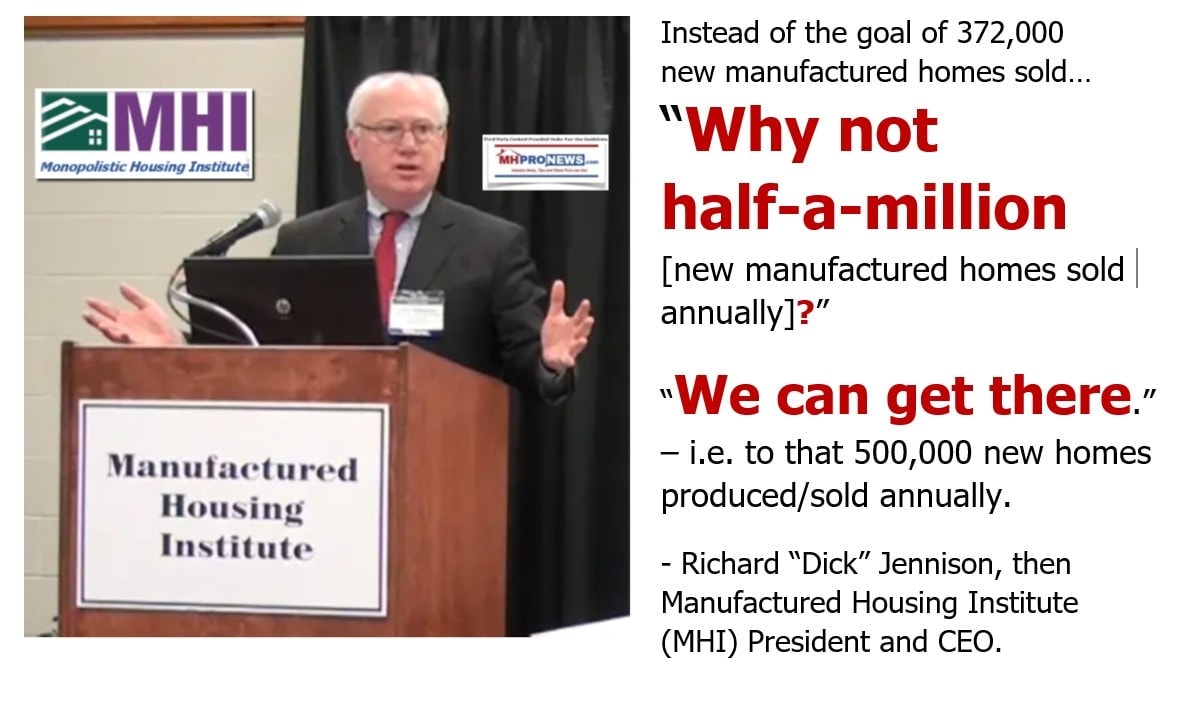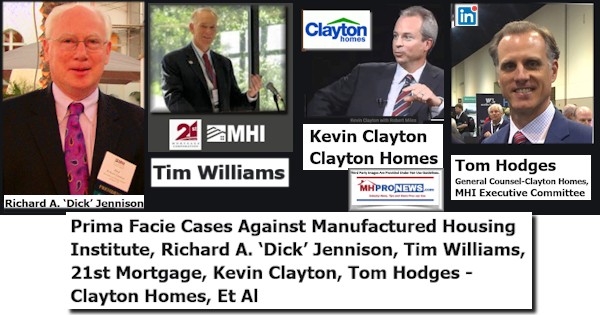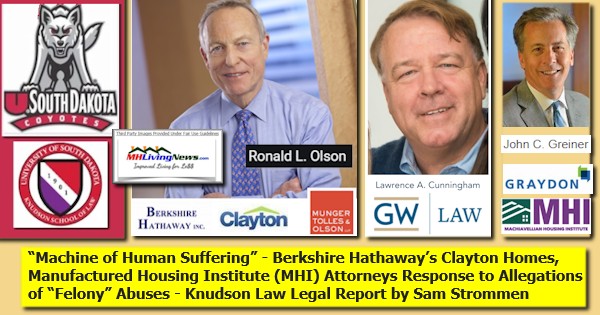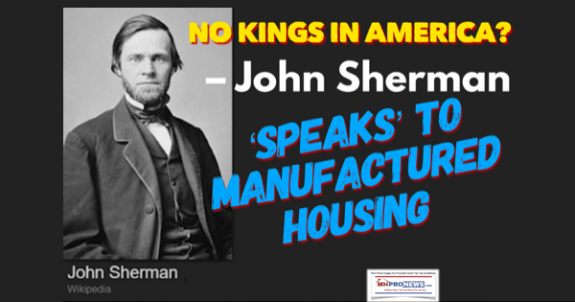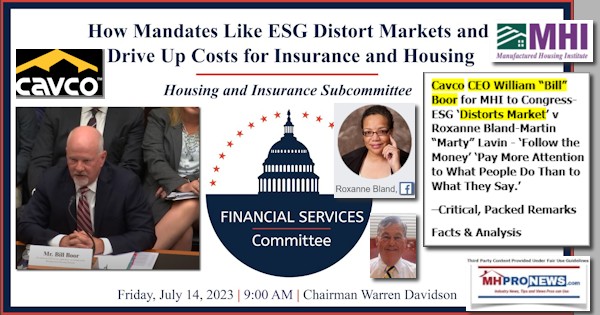
In an address to members of Congress on 7.14.2023 entitled “How Mandates Like ESG Distort Markets and Drive Up Costs for Insurance and Housing” on behalf of the Manufactured Housing Institute (MHI), association Vice Chairman William “Bill’ Boor, CEO of publicly traded Cavco Industries said this. “The DOE’s failed attempt at “E” came at the expense of “S” as it is socially unjust to put out of reach the ability to purchase a manufactured home.” ESG means Environmental, Social and Governance. Boor remarked that the “DOE probably doesn’t fully understand the rule that they’ve issued” on manufactured housing energy standards. Boor added, “There’s real cost associated with it and there are departments like DOE that quite honestly are out of touch with what’s going on in the street.” That and much more Boor said including an admission that manufactured housing production has crashed in 2023 and how that could be fixed would likely bring cheers from broad segments of the manufactured home industry. That said, Boor led-Cavco issued 2023 ESG guidance just a few months ago. The maxim of practicing attorney and bestselling genre-mashing author Roxanne Bland is insightful — “Forget what they told you. You want the truth, follow the money” may apply to Boor’s fascinating testimony.
- Boor’s full testimony to Congress will be provided in Part III. Boor’s statements go well beyond ESG and DOE per se. They include statements about declining manufactured housing production and the Manufactured Housing Improvement Act (MHIA) of 2000 – by name. He spoke about financing, zoning barriers, and more. This is important reading for manufactured housing pros that want to understand precisely why the manufactured home industry is underperforming and how it could be fixed by applying existing federal laws.
- MHI’s emailed brief on Boor’s remarks cover message to industry readers are found in Part I.
- Part II will include Cavco’s press release earlier this year on ESG, including Boor’s remarks on that topic.
- Part III will also include videos posted of Boor’s testimony on manufactured housing.
In this preface, previous observations of Martin “Marty” Lavin, J.D., an MHI award winner are relevant.
Lavin is an attorney and longtime manufactured housing professional who worked in retail, the land lease manufactured home communities (a.k.a. ‘mobile home parks’) sector, and the financing segment of the industry. Lavin worked in the automotive field. Like Bland, Lavin enjoyed writing. Lavin published columns and provided remarks for others – including several for MHProNews.com, see more examples linked here and here – as well as in his own now dormant newsletter.
- It is the context of the similar and insightful remarks of the two attorneys – Bland and Lavin – that prominent Manufactured Housing Institute (MHI) member Cavco Industries (CVCO) remarks to Congress and prior remarks on ESG – ENVIRONMENTAL, SOCIAL AND GOVERNANCE – will be explored in Part IV.
- Part IV will highlight several useful, positive and ironic remarks in the light of additional facts, analysis and MHProNews expert commentary. Items Boor said, but also what wasn’t said before Congress but was previously discussed by Boor in his capacity as CEO of Cavco will be explored.
These remarks and related analysis may prove to be some of the most important and revealing year-to-date by Boor, Cavco Industries (CVCO), and MHI.
Boor’s statements in several respects are similar to points raised by the Manufactured Housing Association for Regulatory Reform (MHARR). Those items and more will be explored in Part IV.
With that preface was the following from MHI to their industry’ readers. As noted, Boor’s complete remarks will follow along with several related items.
Part I – Friday, July 14, 2023 at about 5:50 PM ET from the Manufactured Housing Institute (MHI)
Subject: Housing Alert – MHI Vice Chairman to Congress: ‘E’ Should Not Be at the Expense of ‘S’

MHI Vice Chairman to Congress: ‘E’ Should Not Be at the Expense of ‘S’
Earlier today, Bill Boor, MHI Vice Chairman and President and Chief Executive Officer, Cavco Industries, Inc. testified in a Housing and Insurance Subcommittee Hearing entitled, “How Mandates Like ESG Distort Markets and Drive Up Costs for Insurance and Housing.”
|
Part II
The complete Cavco Industries (CVCO) press release on ESG is linked here. The gist of it those formals comments, sans hotlinks, as of the date shown are as posted below. Note how the following in some ways seems to contradict Boor’s remarks to Congress? What’s up with that detail?

PHOENIX, Ariz., March 28, 2023 (GLOBE NEWSIRE) – Cavco Industries, Inc. (Nasdaq: CVCO) (“Cavco” or the “Company”) today announced the release of its inaugural Environmental, Social and Governance (ESG) website. In its commitment to continuous improvement and transparency, the Company incorporated this important new site into its new consumer-facing Affordable Homes Digital Marketplace at cavcohomes.com/esg.
“After being in business for over 50 years, we launched our first Corporate Responsibility Report in 2021” said Bill Boor, President and Chief Executive Officer. “It is rewarding to see our progress as we continue to execute with excellence, making improvements that grow Cavco’s impact in the lives of our homeowners, our team members and those in the communities we touch, while enabling our long-term success.”
Cavco’s ESG site affirms the company’s progress on its Corporate Responsibility Report roadmap released last year to advance its goals across the tenets of environmental stewardship, social responsibility and corporate governance.
- Environmental Stewardship: Cavco is committed to integrating environmental initiatives into the company’s long-term strategy. We will report regularly on our environmental initiatives and engage and train employees to increase internal environmental awareness.
- Social Responsibility: Cavco prioritizes social responsibility, providing a safe and respectful workplace and investing in local communities. We are driven by the conviction that the best way to build value for all of our stakeholders is by investing in the development and success of our team members. At the very core of everything we do is our intention to help people buy and protect homes that improve their lives.
- Corporate Governance: Cavco expects high standards of ethical conduct from its Directors, management and all employees as described in Cavco’s Corporate Governance Guidelines and Code of Conduct. We will continue to focus on setting clear expectations and providing training, oversight and management involvement.
In addition to reporting on Cavco’s progress on these three core pillars, the site also provides the company’s latest related policies such as Environmental Stewardship, Product Safety and Quality and Promoting Diversity, Equity and Inclusion. …”
Part III – Boor to Congress
The video stream begins at about the 31.38 time mark which includes much more than Boor’s remarks. The remarks as prepared are linked here (the official version) and are as posted below. Note that highlighting is added by MHProNews as part of our analysis and commentary that follows and for planned future follow ups to these revealing remarks.
Written Testimony of:
Bill Boor
Chief Executive Officer Cavco Industries, Inc.
Vice-Chairman
Manufactured Housing Institute
Before the:
U.S. House of Representatives
Committee on Financial Services
Subcommittee on Housing and Insurance
Hearing Entitled:
“How Mandates Like ESG Distort Markets and Drive Up Costs for Insurance and Housing”
Thank you, Chairman Davidson, Ranking Member Cleaver, and Members of the Subcommittee, for the opportunity to testify today about how various mandates can distort markets and drive up costs for housing.
My name is Bill Boor and I am the Chief Executive Officer of Cavco Industries, Inc., a public company engaged in the production of factory-built homes. Our company was founded in 1965 in Phoenix and today we operate 31 manufactured housing factories across the country, 64 retail locations, a manufactured housing lending business and an insurance company. Our company employs approximately 7,000 people across the United States. Last year we produced 19,376 homes, doing our part to help alleviate our country’s critical housing shortage and control rising housing costs.
At Cavco, we focus on delivering the high-quality, safe, reliable, and affordable housing our customers desire in a way that benefits all of our stakeholders from our valued employees, customers, and suppliers, to the communities in which we operate and deliver our homes, to the environment, and, indeed, our investors. We are fortunate to come to work everyday knowing that our work is making a tremendous, positive social impact through the quality, affordable housing we deliver, and a positive environmental impact through processes that are, by their very nature, more efficient and environmentally friendly than alternative forms of construction. We have embraced robust compliance and quality assurance regulations, that are in many instances more stringent than those for traditional site-built homes. However, we do not need to be managed by external interests who generally lack a holistic understanding of our product, our processes, or the housing needs of our customers, and risk imposing requirements that lead to unbuildable or prohibitively expensive products. Our customers and our values drive our priorities within the context of our mission and inform how we define success. Under this principle, Corporate Responsibility is not separable from operating and growing the business. To the contrary, it is good for business and an integral component of what makes Cavco successful.
I am appearing before you today on behalf of the Manufactured Housing Institute (MHI) where I serve as the Vice-Chairman of the Board of Directors. Therefore, my testimony today is on behalf of the manufactured housing industry. In September 2023, I will become MHI’s Chairman. MHI is the only national trade association that represents every segment of the factory-built housing industry. MHI members include home builders, suppliers, retail sellers, lenders, installers, community owners, community operators, and others who serve the industry, as well as 48 affiliated state organizations. MHI’s members are responsible for close to 85 percent of the manufactured homes produced each year. In 2022, our industry produced over 112,000 homes, accounting for over 11 percent of new single-family home starts and 7 percent of total housing starts. Manufactured homes are produced by 35 U.S. Corporations in 147 plants located in communities across the United States.
As context to the topic of Environmental, Social, and Governance (ESG), it is important to understand the track record of the manufactured housing industry. Our industry has a history of significant and meaningful improvement in safety and quality. Our modern, factory-built homes compare favorably to site-built construction in durability and energy efficiency. Many of our homes qualify for Energy Star certification and other government programs for energy efficiency. In short, the Subcommittee should be disavowed of any misperception that ours is a lagging industry that needs to be pulled forward with regard to ESG performance. We build to a federal construction code that has been developed by and administered by HUD for 48 years and we share the objective of continually improving building standards in a balanced manner. The vast majority of manufactured homes being built today exceed HUD’s standards for energy efficiency.
Congress passed the Manufactured Housing Construction Safety Standards Act of 1974 (the MHCSS) making HUD the sole and primary governing body over passage and enforcement of manufactured home construction standards (the HUD Code). The MHCSS can be interpreted as taking into account ESG principles since it requires HUD to balance affordability and cost effectiveness through performance-based construction standards. As a part of the MHCSS, HUD has the statutory responsibility to “facilitate the availability of affordable manufactured homes and to increase homeownership for all Americans.” As new regulations are considered, HUD is “to ensure that the public interest in, and need for, affordable manufactured housing is duly considered in all determinations relating to the Federal standards and their enforcement.”1 MHI strongly supports this approach to our building code.
MHI and its members always have supported, and will continue to support, energy conservation and efficiency efforts. New factory-built manufactured homes currently are at least as, if not more, efficient than new site-built homes. Today’s manufactured homes offer many energy efficient options and have energy efficient features that are tailored to the climate demands of the region in which each home will be sited. Further, the controlled environment of the factory-built process not only offers consumers unmatched quality and affordability due to technological advancements and other advantages, but the industry is a pioneer in the development of processes that value efficiency and reduce waste. Our in-factory home builders constantly are developing new initiatives and technologies, such as advanced, computer-aided design, and comprehensive recycling programs, that dramatically reduce waste. Today’s modern manufacturing plants are so efficient that nearly everything is reused or recycled such as cardboard, plastic, carpet padding, vinyl siding, scrap wood and much more.
Bottom line, we believe ESG goals are best defined by the stakeholders most directly impacted. Whatever label one wishes to put on it, today’s housing manufacturers are in the business of delivering positive social, environmental and economic impact by listening to our customers and working for them and with other relevant stakeholders to deliver the high-quality jobs and housing American families want and need.
An unfortunate example of an imbalanced regulatory approach to ESG exists in energy standards the Department of Energy (DOE) promulgated for new manufactured homes last year. Even though our industry clearly leads the way in energy efficient building processes that produce energy efficient residential housing, these standards create a number of legal, policy, and procedural problems that stand to adversely impact our industry, our customers in search of quality, affordable housing, and policymakers’ goals of boosting affordable housing supplies. However well-intentioned, these standards were developed without the input of those who know the housing manufacturing business or who are most in touch with the needs and concerns of housing stakeholders, and resulted in standards that are in conflict with the MHCSS. If finalized as proposed, these standards would significantly threaten the affordability of new manufactured homes – our nation’s most affordable homeownership option – by imposing costs on homeowners that far exceed any reasonable value placed upon the hoped-for energy savings. Stated otherwise, low-income consumers will be forced bear the cost of an overzealous and ill-informed approach to ESG at the expense of the American dream of homeownership, but also, perhaps counterintuitively, at the expense of helping households move into what for most would be newer and more energy-efficient housing than they have now.
Because it is such a stark example of how a well-intentioned energy mandate can have significant negative consequences for affordable housing, my testimony will focus primarily on problems and solutions with regard to the DOE energy standards for manufactured housing. This should be of particular interest to this subcommittee, as HUD is supposed to have sole responsibility for federal manufactured home construction standards according to the MHCSS. MHI calls on Congress to reaffirm HUD’s exclusive role in setting manufactured housing construction standards by passing H.R. 3327, the Manufactured Housing Affordability and Energy Efficiency Act of 2023, which is bipartisan legislation that will subject all building standards for manufactured housing to the HUD Code process. This would eliminate crippling conflicts in federal regulations over the construction of manufactured homes, which currently have now emerged between DOE’s standard and the HUD Code. H.R 3327 would ensure that homeownership affordability and the logistics of factory-built construction get fair consideration in the development of federal manufactured home standards, which was the original intent of Congress in establishing a federal construction code for manufactured housing.
My testimony will also touch on other manufactured home availability and affordability issues where we believe Congress and federal agencies can take constructive actions to expand homeownership opportunities. Rather than artificially making it more difficult for us to produce quality, affordable housing we believe there are things that Congress and federal agencies can do to facilitate the availability of manufactured housing. For example, HUD is authorized to, and should do more to, intervene when localities impose barriers restricting manufactured housing. MHI also supports the specific items in the Administration’s Housing Supply Action Plan calling for increasing the usability of FHA’s Title I loan program for manufactured housing (including greater securitization of Title I loans through Ginnie Mae’s platform) and updating the HUD Code to allow manufacturers to modernize and expand their production lines. In addition, Congress should support the preservation, expansion and development of manufactured home communities.
Manufactured Housing Has a Critical Role in Meeting Nation’s Housing Supply Challenges
As Congress confronts the nation’s housing supply challenges, it is important that the Committee understand that manufactured housing is the largest form of unsubsidized affordable housing in the United States – and by far the most affordable homeownership option for American families. However, the longstanding historical role of manufactured housing as the most affordable homeownership option could be undermined severely depending on how certain federal policies are handled.
Manufactured housing offers affordability and quality to consumers because of technological advancements, cost savings, and efficiencies associated with the factory-built process. Manufactured housing is the only type of housing constructed to a federal residential building code, which is regulated by HUD. The HUD Code’s single regulatory framework for home design and construction includes standards for health, safety, energy efficiency, and durability. Since 2000, these federal standards have been developed and revised through a deliberative body made up of industry professionals, state officials, and consumers – the Manufactured Housing Consensus Committee (MHCC) – which makes recommendations for the HUD Secretary to act on, retaining final authority over new standards. Further, manufactured homes are subject to minimum federal installation standards. As a result, consumers enjoy the reliability of new manufactured homes that meet high and uniform national standards.
In 2022, the average sale price of a new site-built single-family home without land was $413,160. By comparison, in 2022, the average price of a new manufactured home was $127,250. In addition, statistics dramatically show that manufactured homes disproportionately serve low and moderate-income families, compared to site-built homes. The average manufactured home homeowner’s median household income is approximately $35,000 per year, far below the national average. In contrast, the average median income for a site-built homeowner is over $100,000.
The manufactured housing industry is at a critical crossroads due to regulatory barriers and market forces. Cumulative shipments from January 1 through April 30, 2023, decreased by 30 percent compared to the same time period of 2022. April 2023 shipments were down 34 percent compared to April 2022 shipments. These decreases in shipments are being caused by prospective homeowners being priced out of potential purchase due to increased costs of construction and skyrocketing mortgage interest rates – factors affecting all segments of the housing industry. When families are priced out of buying a manufactured home, they are priced out of the security and wealth-building benefits of homeownership.
Congress Should Ensure HUD is the Sole Regulator for all Manufactured Housing Construction Standards
The most significant challenge facing the affordability of manufactured home ownership is pending manufactured housing energy standards finalized by the DOE in May 2022. Unless these standards are substantially revised, (1) the cost of every new manufactured home will unnecessarily increase by thousands of dollars per home; (2) the annual costs incurred by the homebuyer through increased mortgage costs will exceed the purported energy savings under the new standards; (3) many potential manufactured homebuyers will no longer qualify for a mortgage loan, due to the impact of higher prices on debt to income (DTI) ratios and related prudent lending limitations; (4) manufactured home energy standards will be governed by inappropriate standards designed for site-built homes, instead of by standards that take into account the distinct characteristics and benefits of manufactured homes; and (5) manufactured homes will be held to a higher energy efficiency standard than site-built homes.
The problem is simple: the standards were developed by DOE without any meaningful input from HUD, whose overall mission is housing affordability, and which is the exclusive repository within the federal government of expertise regarding construction and safety standards. The DOE’s narrow attempt to push a singular ESG objective has devastating unintended consequences for housing affordability.
The solution is also simple: DOE standards must be subject to the HUD Code process, with HUD having final authority to issue such energy standards. And, HUD should follow the guidance of its experts on the subject, the MHCC – a body that has already found serious fault with the proposed DOE standards.
The MHCSS gives HUD jurisdiction over the construction requirements for manufactured housing construction and it clearly states that energy conservation standards “shall take into consideration the design and factory construction techniques of manufactured homes and shall provide for alternative practices that result in net estimated energy consumption equal to or less than the specified standards.”[1] The HUD Code regulations require these energy efficiency construction methods to be “within the limits of reasonable economics.”[2] However, the jurisdictional lines were blurred in 2007 when a rider was attached to the Energy Independence and Security Act of 2007 (EISA). In that rider, the DOE was directed to “establish standards for energy efficiency in manufactured housing.” 4 This language had not been subject to congressional hearings and the House Financial Services Committee, which has jurisdiction over HUD and therefore the manufactured housing construction code, was not aware of this provision. The language contained in the EISA rider was poorly crafted and these flaws were exacerbated by the DOE’s fundamental lack of understanding about the realities of factory-built home construction.
In fact, HUD’s federal advisory committee, the MHCC, refused to recommend wholesale adoption of the DOE’s rule into the HUD Code. When the MHCC considered the DOE energy standards last fall, it determined there was a failure by the DOE to consider the unique characteristics of manufactured home construction. The MHCC determined that “DOE circumvented the standards development process prescribed in EISA which requires cost justification and consultation with HUD.” It also determined that “DOE provided an energy conservation standard which was based on site-built construction and applied it to a performance-based national code.”
The MHCC warned that: “If adopted as written, the final [DOE] rule would adversely impact the entire Manufactured Housing program and cost increases associated with compliance would reduce prospective purchasers (especially minorities and low-income consumers) from durable, safe, high quality and affordable housing.”
Instead of adopting the DOE standard, the MHCC recommended vast improvements to energy efficiency standards for manufactured homes while tailoring these standards to the unique methods of factory-built construction and to the aim of preserving the affordability of the product. MHI strongly supports the MHCC’s recommended revisions to the HUD Code to increase energy efficiency standards in a way that makes sense for affordable, factory-built construction.
MHI strongly encourages passage of H.R. 3327, which would reaffirm in statute that HUD, through the HUD Code, is the sole regulator of construction and safety standards for manufactured housing. This is absolutely essential for a functioning manufactured housing market because HUD has an established process by which to update the building code for manufactured housing. Unlike the process at HUD, the Department of Energy (DOE) issued these standards without engaging with relevant stakeholders. The result was a regulation based on a building code that is for site-built homes, which is where materials are taken to a construction site where the home is built. A construction code based on the site-built process does not apply to the construction methods of manufactured homes, which are assembled in a factory and then transported to the home site.
The unintended consequence of a second industry regulator implementing misguided standards that significantly diminish affordability for the most vulnerable low-income households can be readily corrected with passage of H.R. 3327. DOE’s own analysis showed that its rule would increase costs for homebuyers without reciprocal energy savings. Even based on its flawed and overly optimistic assumptions, DOE determined that its rule would result in an average cost increase of around $700 for a single-section home and $4,100 to $4,500 for a multi-section home. DOE’s analysis hinged on purchase price, not the ability of a homeowner to obtain financing based on debt-to-income ratios and other factors. A cost-benefit analysis performed by MHI and provided to the DOE demonstrated that the DOE’s rule would result in a net loss of up to $5,500 to a consumer for a single section home and up to $6,800 for a multi-section home depending on the location. An economic study performed by international economic consulting firm, the Analysis Group, confirmed that when using updated cost figures, approximately 95% percent of manufactured home shipments would have a negative 10-year life cycle cost under the DOE’s rule.
The DOE rule is a perfect example of how external ESG mandates distort markets and have unintended consequences that outweigh any potential benefit to consumers, businesses, and the environment. The DOE rule will increase cost of manufactured homes to the point of requiring thousands of low-income consumers to remain in older, less energy-efficient housing, and miss what for many may be their only opportunity to attain homeownership. Stated otherwise, the DOE’s failed attempt at “E” came at the expense of “S” as it is socially unjust to put out of reach the ability to purchase a manufactured home. The MHCSS at HUD’s direction does a better job at holistically promoting ESG principles. Under this mandate, the manufactured housing industry has and will continue to provide quality, energy-efficient homes at affordable prices to satisfy the critical need for affordable housing in the United States. Implementation of the DOE’s rule will only increase the affordable housing shortage in the United States with no appreciable environmental benefit.
The right approach is established in the current HUD Code process where HUD is required to properly balance construction standards with homeownership affordability to ensure that manufactured homes remain an attainable source of homeownership for American families. Congress must reaffirm this process to ensure standards from other agencies that lack an understanding of the manufactured housing construction process do not limit the dream of homeownership.
HUD Should Intervene When Localities Place Restrictions on Manufactured Housing
Manufactured homes serve many housing needs in a wide range of communities from rural areas where housing alternatives are few and construction labor is scarce and/or costly, to higher-cost metropolitan areas as in-fill housing. However, restrictive zoning and land planning ordinances have a profound impact on the availability of manufactured housing.
Across the country, there are countless state and local zoning, planning, and development restrictions that either severely limit or outright prohibit the placement of a manufactured home. These practices harm those who could attain homeownership through manufactured housing. Examples of these discriminatory practices include:
- Outright Bans – Adoption of ordinances that eliminate or ban the placement of manufactured homes in cities, localities or municipalities.
- Zoning Barriers – Changing zoning laws after developers have purchased land to prevent the development of manufactured housing communities.
- Segregated Zoning – Banning manufactured homes as a “permitted use” in residential zones and segregating them into one special overlay zone in one area of the city. These areas are usually far away from essential services and/or the homes act as buffers to commercial zones.
- Lot Size Requirements – Requiring a certain number of acres for placement of a manufactured home on private land.
- Value Requirements – Setting an arbitrary and capricious value that a manufactured home must meet before it can be sited in a city, locality or municipality.
- Age Prohibitions – Prohibiting placement or movement of a home based upon its age.
- Contradictory Construction Requirements – Imposing site-built construction standards to HUD Code homes.
These examples reflect a growing trend whereby local jurisdictions adopt land planning ordinances and utilize code enforcement that excludes manufactured housing.
There are actions that HUD can take to improve the availability of manufactured housing in jurisdictions across the country. HUD has the statutory authority to prevent local jurisdictions from excluding manufactured homes through the “Manufactured Housing Improvement Act of 2000,” which specifically states that when HUD construction and safety standards are in effect, a locality does not have authority to establish different standards. The statute explicitly states that this preemption should be “broadly and liberally construed” to avoid disparate local requirements. HUD has the authority and duty to pursue more vigorous enforcement of this provision, which clearly establishes federal supremacy for manufactured housing construction.
Due to lax enforcement of preemption by HUD, many localities use requirements that deviate from the HUD Code to accomplish an underlying objective of zoning out manufactured housing (or making it prohibitively expensive). To address this, HUD must strengthen preemption enforcement and must provide clearer, more transparent guidelines for compliance. Further, HUD must respond promptly and definitively whenever localities violate this provision. While HUD has pursued individual cases where local jurisdictions have introduced construction and safety standards that are not consistent with the HUD Code or have imposed zoning and planning requirements that exclude HUD-compliant manufactured homes, HUD must take on a much greater role in this effort. HUD has a statutory mandate to do so.
HUD should also issue an updated policy statement concerning federal preemption as its current statement has not been updated to reflect the Manufactured Housing Improvement Act of 2000. The current statement is from 1997 – “Statement of Policy 1997-1: State and Local Zoning Determinations Involving the HUD Code.” Updating this statement would galvanize HUD’s responsibility to facilitate the availability of affordable manufactured homes across the country.
Congress Should Remove the Chassis Requirement
The current definition of a “manufactured home” based on the “permanent chassis” is many decades old and reflects the origins of manufactured housing in the United States when these homes were “trailers.” However, modern manufactured housing has little in common with a trailer. Instead, today’s manufactured homes are indistinguishable from traditional site-built homes with the primary exception of the permanent chassis which is required only for transportation and can now be readily removed on site. But because the “permanent chassis” is part of the definition of a “manufactured home,” the manufactured housing industry cannot remove the chassis from a manufactured home without changing the law.
If the permanent chassis requirement were removed, most manufactured homes would still be built and transported on a chassis, but the chassis could be removed on site and recycled after the home is permanently installed on a foundation. Among other benefits, removing the permanent chassis requirement would allow for manufactured homes to have a more desirable low-profile installation aesthetic, facilitate more multi-story HUD Code home designs, improve energy efficiency, reduce waste (most notably the heavy steel chassis that could be recycled), and overcome government zoning prohibitions that use the chassis requirement as a method for zoning manufactured housing out of their area.
Above all else, removing the chassis requirement would facilitate continued innovation that will lead to lower costs to consumers. Additionally, allowing manufacturers to construct homes that are designed to be removed from a permanent chassis would allow for more aesthetically pleasing design option that could remove the decades-old “stigma” from manufactured housing and discriminatory zoning requirements based on that “stigma.” Therefore, the removal of the permanent chassis requirement is a perfect example of how Congress can remove barriers to affordable housing.
Federal Policies Should Support Development and Preservation of Land-Lease Communities
There are more than 43,000 land-lease manufactured housing communities in the country with almost 4.3 million home sites. About one-third of the new manufactured homes built today are placed in these land-lease communities. Homeownership in land-lease communities is often less expensive than renting an apartment, providing an affordable form of homeownership to many Americans and their families.
Just as in other forms of housing, some policymakers have raised concerns about rising rents in manufactured home communities. The truth is that all forms of housing are seeing significant price hikes – and rent levels for leased land in manufactured home communities are rising at a lower overall rate than for rental housing units.
In fact, according to DataComp, the largest provider of manufactured home appraisals, inspections, and market data, the average site-rent increase in 2021 was approximately 3.6 percent. Average manufactured housing community rent increases are substantially below the increases experienced in other forms of housing.
Demand for living in land-lease communities continues to rise because of the financial and lifestyle benefits of owning a home. Consumers are attracted to well-maintained outdoor spaces and neighborhood amenities. Professional management of land-lease communities ensures that critically needed infrastructure like water, sewers, roadways are continuously updated to protect the homeowner’s investment. Capital expenditures by professionally managed community operators continue to increase annually and at faster rates than rents.
U.S. Census and MHI data consistently show that residents of land-lease communities are highly satisfied and are likely to recommend living in manufactured housing communities to others. In fact, 90 percent of people living in manufactured housing communities are satisfied with their homes—95 percent in senior-only communities and 87 percent in all-age communities report satisfaction with their homes. These satisfaction rates show that, overwhelmingly, land-lease community owners are meeting their resident’s expectations.
The federal government has much it can do to support these important and vibrant communities. Federal affordable housing policies should encourage capital investment into land-lease communities to build, update, and preserve land-lease communities.
One initiative Congress should consider is creating more flexibility with respect to tax incentives in Opportunity Zones for investments that build and preserve affordable manufactured home communities.
Another important Congressional action is for HUD to use its statutory discretion to make all community owners, including for-profits, eligible for the $200 million in the Fiscal Year 2023 T-HUD appropriations bill for grants and financing to preserve and revitalize manufactured housing communities. Grant programs like this should be awarded competitively to the best applicants and applications, that can do the most to preserve affordable manufactured homeownership.
Finally, Fannie Mae and Freddie Mac should continue and expand their commitment to financing manufactured housing communities. Through our National Communities Council (NCC), MHI was an early proactive participant in working with consumer groups and FHFA to develop balanced tenant protections for Duty to Serve for manufactured homeowners leasing the land on which the home was cited – that resulted in the tenant protection guidelines that the GSEs have in place today. These tenant protections include all of the basic consumer protections for such homeowners; efforts to go beyond this are unnecessary and would be self-defeating, since they could result in community owners deciding Fannie Mae and Freddie Mac loans are no longer viable for this purpose.
FHA Should Do More to Support Financing for Manufactured Housing.
The Federal Housing Administration (FHA) has a critical role in insuring mortgages for first time, minority, and other underserved borrowers. Because of manufactured housing’s affordability, FHA should do more to support financing for manufactured housing. We appreciate the Administration’s recognition of the need to update the FHA programs for manufactured housing in its Housing Supply Action plan. Because of a lack of updates, FHA’s mortgage insurance programs are not serving those seeking homeownership through manufactured housing. FHA’s Title I program for personal property loans needs substantial reforms to restore its role in this sector and FHA’s Title II program for real property loans needs updates so that FHA can better fulfill its mission of homeownership.
In 2022, zero manufactured home loans were insured by FHA’s Title I program. And manufactured home loans only made up 4.3 percent of all new single-family loans insured by FHA’s Title II program that same year. Several actions will remedy this situation. For the FHA Title I Program, FHA should consider these changes:
- Align FHA manufactured home definitions with HUD Code definitions;
- Allow an adequate loan origination fee;
- Allow financing of closing costs; and
- Align FHA Title I underwriting standards with Title II standards.
For the FHA Title II program, FHA should consider these changes:
- Improve guidance for CrossMod homes to ensure accurate appraisals, as both Fannie Mae and Freddie Mac have already done;
- Incorporate the HUD Code’s model minimum installation standards; Revise the requirements for manufactured homes in flood zones; and
- Lift the prohibition against financing for relocated homes.
With these changes, FHA can better accomplish its goal of providing affordable homeownership for first-time, minority and other underserved borrowers.
Conclusion
MHI appreciates the opportunity to testify before the Committee about mandates that have created barriers to affordable housing. The industry is supportive of the MHCC’s (HUD’s federal advisory committee) recommendations to improve energy efficiency standards for our homes. Because HUD is our primary regulator and understands our construction process, the MHCC’s approach would enhance environmental outcomes while eliminating the contradictions and feasibility issues created by the DOE rule, while preserving cost effectiveness for aspiring homeowners. The DOE’s unfamiliarity with the manufactured housing construction process and lack of meaningful engagement with stakeholders most directly impacted demonstrates the dangers of mandates that sound laudable but can wind up undermining the best outcomes for American households – in this case by reducing the supply of high-quality, affordable, and energy-efficient housing options. We urge swift passage of H.R. 3327 to ensure HUD retains sole jurisdiction over implementation and enforcement of all construction standards for manufactured housing.
Thank you for your recognition that manufactured housing is an integral component to addressing the nation’s affordable housing supply challenges. By ensuring HUD uses its authority to prevent localities from imposing barriers to placement of manufactured homes, ensuring that FHA does more to support financing for manufactured homes, supporting land lease communities, and removing the chassis requirement, this Subcommittee can help ensure that the innovations of manufactured housing are an essential part of HUD’s work to help more Americans achieve quality homeownership at an attainable price. As the only national trade association that represents every segment of the factory-built housing industry, we look forward to working with you to support the 22 million people who live in manufactured homes today and the many more who are seeking attainable homeownership in a quality home. ##
1 The MHCSS has the following express statutory purpose:
- (1) to protect the quality, durability, safety, and affordability of manufactured homes;
- (2) to facilitate the availability of affordable manufactured homes and to increase homeownership for all Americans;
- (3) to provide for the establishment of practical, uniform, and if possible, performance-based Federal construction standards for manufactured homes;
- (4) to encourage innovative and cost-effective construction techniques for manufactured homes;
- (5) to protect residents of manufactured homes with respect to personal injuries and the amount of insurance costs and property damage in manufactured housing, consistent with the purposes of this section;
- (6) to establish a balanced consensus process for development, revision, and interpretation of Federal construction and safety standards for manufactured homes and related regulations for the enforcement of such standards;
- (7) to ensure uniform and effective enforcement of Federal construction and safety standards for manufactured homes; and
- (8) to ensure the public interest in, and need for, affordable housing is duly considered in all determinations relating to the Federal standards and their enforcement.
[2] 54 U.S.C. § 5403(g)
[3] 24 C.F.R. § 3280.505(a)(“The goal of the infiltration control criteria is to reduce heat loss/heat gain due to infiltration as much as possible without impinging on health and comfort and within the limits of reasonable economics.”) 4 42 U.S.C. § 17071(a)(1).
[4] 42 U.S.C. § 17071(a)(1).
MHProNews Note: for the photos in the appendix, and the PDF of the document above, click here. Note one of those photos may be from the 2023 HUD-NAHB ‘Innovate Housing Showcase.’ If so, that unit is a modular code factory-built housing product, not a HUD Code manufactured home, as a previous Cavco press release indicated.
Part IV – Additional Information with More MHProNews Analysis and Commentary
There are several good features to what Boor said, but there are problematic aspects too.
In no particular order of importance are the following observations.
1) Quoting Boor: “If finalized as proposed, these standards would significantly threaten the affordability of new manufactured homes – our nation’s most affordable homeownership option – by imposing costs on homeowners that far exceed any reasonable value placed upon the hoped-for energy savings. Stated otherwise, low-income consumers will be forced bear the cost of an overzealous and ill-informed approach to ESG at the expense of the American dream of homeownership, but also, perhaps counterintuitively, at the expense of helping households move into what for most would be newer and more energy-efficient housing than they have now.” MHARR has been warning that MHI appears to be poised to make a deal with DOE to essentially lock in the current standards instead of forcing the DOE to start the rule making process from scratch and in a legally appropriate fashion in conjunction with HUD and the MHCC process. The MHI linked Texas Manufactured Housing Association has also essentially signaled that is to be expected, which supports MHARR’s concerns. If MHI does allow the DOE regulations to go into effect without using their legal resources well in advance of the pending rule’s implementation in the wake of these comments by Boor, several potential legal issues could arise for Boor, Cavco, and MHI. Specifically, without further deployment of the necessary legal resources to STOP and KILL this DOE rule that MHI and their leaders have repeatedly stated could harm the industry, then hypocrisy isn’t the worst think that MHI, Cavco, Boor, et al could be accused of doing. MHARR very specifically pointed out MHI’s history on the DOE rule, which includes how MHI worked with the DOE to advance, rather than stop, the now-looming rule. They could be charged with possible perjury, RICO, deceptive trade practices and market manipulation that may violate the felony provisions of the Sherman Antitrust Act. See the remarks by non-manufactured housing industry attorneys, including the in depth evidence and thoughts of Sam Strommen, at this link here.
2) Quoting Boor: “MHI calls on Congress to reaffirm HUD’s exclusive role in setting manufactured housing construction standards by passing H.R. 3327, the Manufactured Housing Affordability and Energy Efficiency Act of 2023, which is bipartisan legislation that will subject all building standards for manufactured housing to the HUD Code process. This would eliminate crippling conflicts in federal regulations over the construction of manufactured homes, which currently have now emerged between DOE’s standard and the HUD Code.” Let’s presume, for discussion sake, that MHI’s proposed legislation on this topic was and is good and is well intended. That still begs the question. This law that started the DOE energy rule process was enacted in 2007. Specifically, as Boor aptly noted in the remarks above, it is “the Energy Independence and Security Act of 2007 (EISA).” Why didn’t MHI immediately begin back then, over a decade ago, the process of passing the legislation that they now seek? That inquiry reveals an array of potential problems for Boor, Cavco, and MHI. For instance: didn’t their staff and leaders foresee that this day may come? Indeed, as MHARR documented, MHI was quietly working with the DOE, a fact revealed by documents with MHI produced by FOIA requests to the DOE obtained by MHARR. As longtime and detail-minded readers of MHProNews may recall, MHProNews obtained two of those “smoking gun” documents agreed to by MHI in conjunction with ‘energy interests‘ prior to MHARR’s more detailed revelations. Put differently, Boor and MHI appears to be posturing and paltering once again, apparently for the sake of misleading trusting industry professionals. And if so, then Boor could be the subject of several types of legal woes as a result of these remarks, including making arguably deliberately misleading statements to Congress. Something similar could be applied to others at MHI, because Boor made these remarks speaking on behalf of that association.
3) Quoting Boor: “The manufactured housing industry is at a critical crossroads due to regulatory barriers and market forces. Cumulative shipments from January 1 through April 30, 2023, decreased by 30 percent compared to the same time period of 2022. April 2023 shipments were down 34 percent compared to April 2022 shipments. These decreases in shipments are being caused by prospective homeowners being priced out of potential purchase due to increased costs of construction and skyrocketing mortgage interest rates – factors affecting all segments of the housing industry. When families are priced out of buying a manufactured home, they are priced out of the security and wealth-building benefits of homeownership.” Essentially ever word Boor uttered in that part of his remarks are quite correct. But that still begs several questions. For example. Given those facts, and other points he made in his remarks about what is commonly called “enhanced preemption” or “enhanced federal preemption” under the Manufactured Housing Improvement Act of 2000 (MHIA). Then why hasn’t MHI sued to get those enhanced preemption rights under the MHIA that Boor and MHI’s Gooch previously said exist? With his preemption focused remarks – editorially MHProNews would broadly concur with – Boor logically opened the door to what MHARR’s Danny Ghorbani told MHProNews in the exclusive Q&A linked here. His own shareholders and stakeholders may now be in a position to launch a class action or other legal challenges, based on Boor’s own words and their logical importance for Cavco’s, MHI, and other MHI-member producers’ behaviors. By carefully documenting such remarks, past and contemporary, the seemingly odd behavior of MHI can best be understood as subtle effort to consolidate the industry into ever fewer hands who happen to be MHI members, as Strommen asserted. Once again, to informed eyes, these arguably reasonable remarks by Boor appear to be aimed at appeasing those in MHVille – such as MHARR, MHProNews, MHLivingNews and other critics of MHI on the need to enforce enhanced preemption. More could be said, but to save time, let’s point to the possible consequences above via the point made in #4 below.
4) MHProNews has been apparently alone in manufactured housing professional trade media in pointing out the concerns raised by analyst Greg Palm with Bill Boor in the earnings call linked below. Why didn’t Boor mention the MHIA, or enhanced preemption and it’s lack of enforcement in his response to Palm? Why didn’t Boor commit Cavco’s own legal resources in such an effort, if necessary, on behalf of shareholders and stakeholders? Why didn’t Boor use the specific language that members of Congress, MHARR, or Lesli Gooch use – “enhanced preemption” or “enhanced federal preemption” with Congress or with analysists like Palm? Oops?
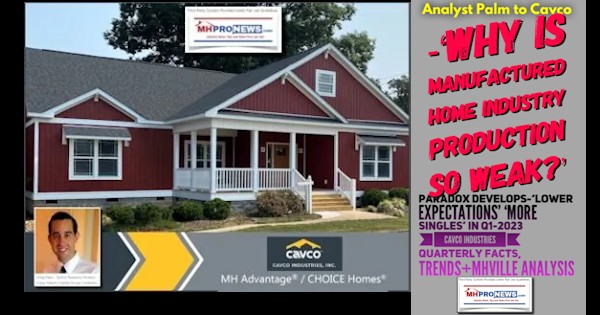
5) Taken at face value, Boor’s remarks about FHA Title I, or the Duty to Serve (DTS) and financing more broadly are also important and useful. But once more, he has confirmed MHARR’s contention. Similar questions emerge. Why didn’t MHI and/or Boor-Cavco press these issues years ago, through legal action if necessary? So, while Boor’s remarks for MHI put them on paper in a similar stance with MHARR, on closer inspection, what Boor’s remarks did was reveal that MHARR’s allegations of an MHI shell game have merit. Oops?

6) Quoting Boor: “Due to lax enforcement of preemption by HUD, many localities use requirements that deviate from the HUD Code to accomplish an underlying objective of zoning out manufactured housing (or making it prohibitively expensive). To address this, HUD must strengthen preemption enforcement and must provide clearer, more transparent guidelines for compliance. Further, HUD must respond promptly and definitively whenever localities violate this provision. While HUD has pursued individual cases where local jurisdictions have introduced construction and safety standards that are not consistent with the HUD Code or have imposed zoning and planning requirements that exclude HUD-compliant manufactured homes, HUD must take on a much greater role in this effort. HUD has a statutory mandate to do so.” Superficially, MHI critics, including MHARR, MHProNews, MHLivingNews, the late resident-community leader Robert “Bob” Van Cleef, and others could applaud if it was sincere and backed up – think Lavin and Bland’s remarks above – by matching action. But in the absence of that matching follow through, MHI looks either inept, foolish, or possibly illegally corrupt. See the report linked above to learn more, as well as what Strommen and other attorneys said at this link here.
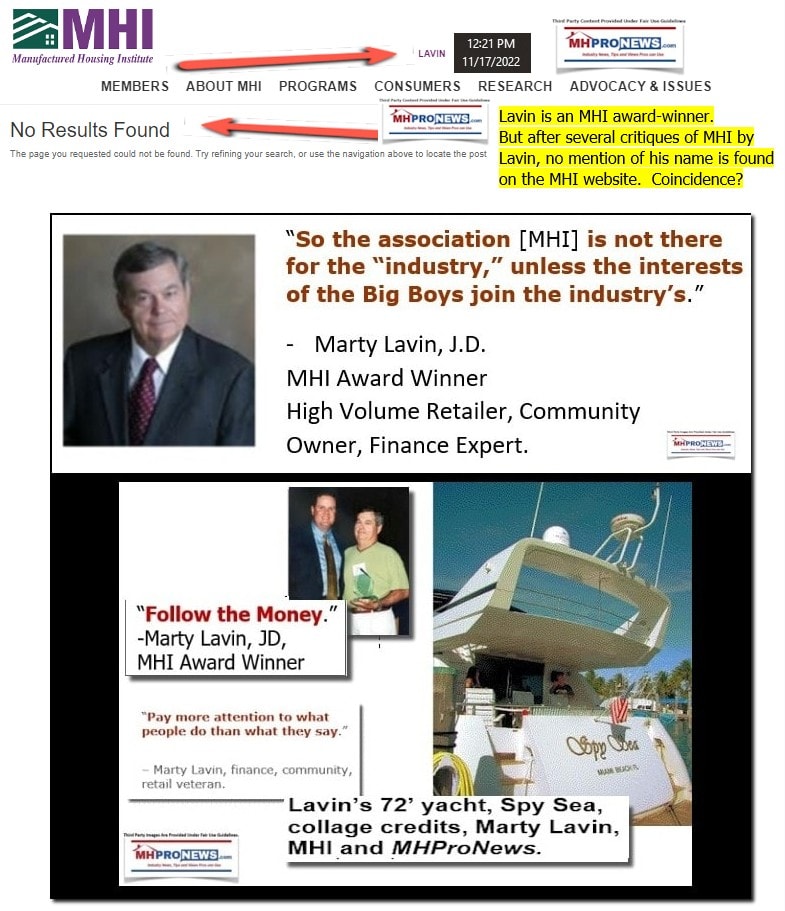
7) MHProNews has been pressing the point for some time that MHI aligned trade media and bloggers are either MIA on some of these key issues that Boor himself raised, and/or they are giving apparent cover or distractions for MHI. There could be pages more of such analysis of what Boor said, and the range of disconnects between what Boor-Cavco-MHI et al have done and failed to do. But in this one article, Boor’s remarks effectively confirm the validity of each and every significant issue MHProNews has reported on since the ‘aha moment’ hit that MHI leaders have been posturing and paltering for years. This can explain why MHI leaders decline comments and avoid public engagement with MHProNews. Something similar could be said about MHARR being ‘vindicated’ on their issues. That said, what’s next? Among other things, MHProNews will hereby publicly invite Boor to be interviewed to explain these disconnects in a video or written formats. If he declines doing so, that could be seen as his realization that he has been boxed in by their own words and behavior. Once more, Bland’s and Lavin‘s maxims apply. Words can be cheap, deceptive, and misleading. When words and behavior don’t match, follow the money trail to understand why. And in the world of a publicly traded company, as the Securities and Exchange Commission (SEC) has said, material omissions and misleading remarks can be actionable.
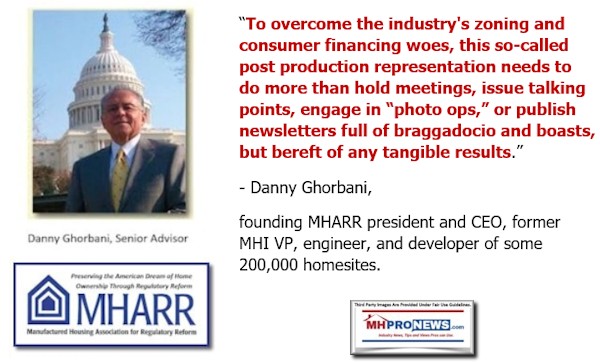
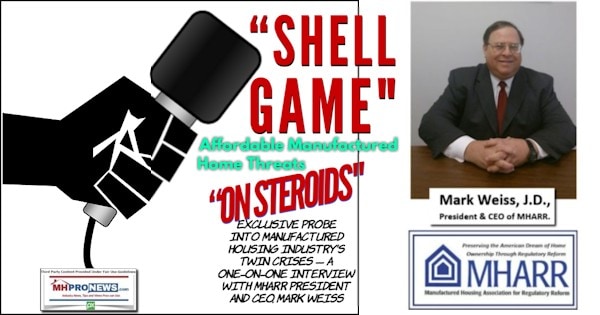
Boor was specifically asked to respond to the questions in the postscript, linked above. MHProNews has evidence that Boor, MHI, and other MHI corporate leaders received that request. Once again, that raises an array of legal questions that could make the problems that Cavco and Joseph Stegmayer faced pale in comparison.

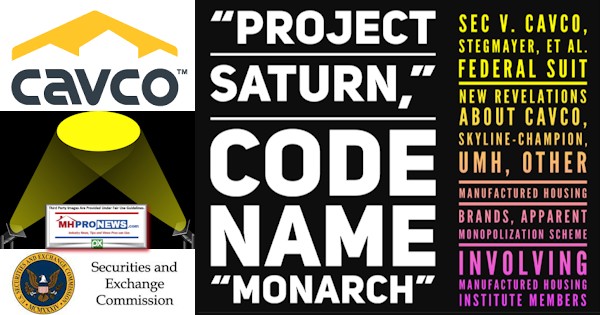
More could be said, but that’s sufficient for now to bring this to a summary and conclusion.
Summary and Conclusion
MHProNews has uniquely plumbed the remarks of corporate and MHI staff leaders, past and present for years. Because of our industry-leading audience size and engagement, MHProNews has consistently used facts, evidence, and industry expertise to point to the underlying causes and potential cures for what ails manufactured housing. Boor confirmed many of the insights MHProNews, as well as MHARR, has made for years.
Boor’s remarks certainly didn’t get into evidence-based allegations of antitrust violations, apparent failures in making proper “material” disclosures to shareholders and investors, and how the bloggers and trade media that MHI et al are propping up – which is their right – are nevertheless indicative of a sly scheme to monopolize the industry through steady consolidation caused in part by failing to take every possible step to mitigate the very issues that Boor outlined in his remarks above.
So, not only has Boor vindicated, as MHARR likes to occasional say, what MHARR has argued on behalf of industry independents and consumers for well over a decade. But Boor has also vindicated the years of groundbreaking research and reports by this publication. It also makes our would-be competitors’ apparent failures for not covering topics that Boor himself raised with Congress.
There is more ahead, but that’s sufficient for now.
MHProNews plans to press these topics through fact- and evidence-packed reports, analysis, and expert commentary until the day comes that MHI and its leaders, public officials, attorneys, and others take the corrective action needed. Stay tuned to the front lines of the battle for what’s true in manufactured housing what amounts to circus politics and theatrical head fakes. Paltering and posturing arguably have to be kept in mind on virtually everything that MHI-linked leaders like Boor and his collogues say and do. Precisely because of Cavo’s problematic history under Joseph “Joe” Stegmayer, much deeper questions must be asked and answered. Because, as this article noted at the top: “Forget what they told you. If you want the truth follow the money.” And ‘Pay more attention to what people do than what they say.’ ###
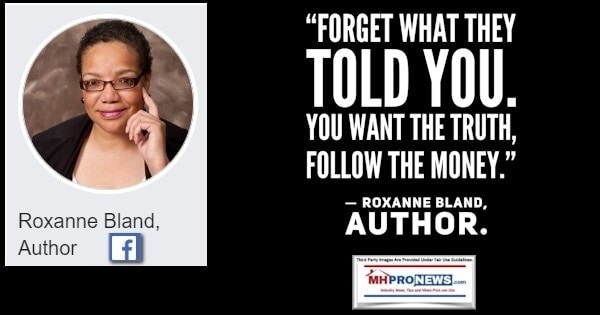

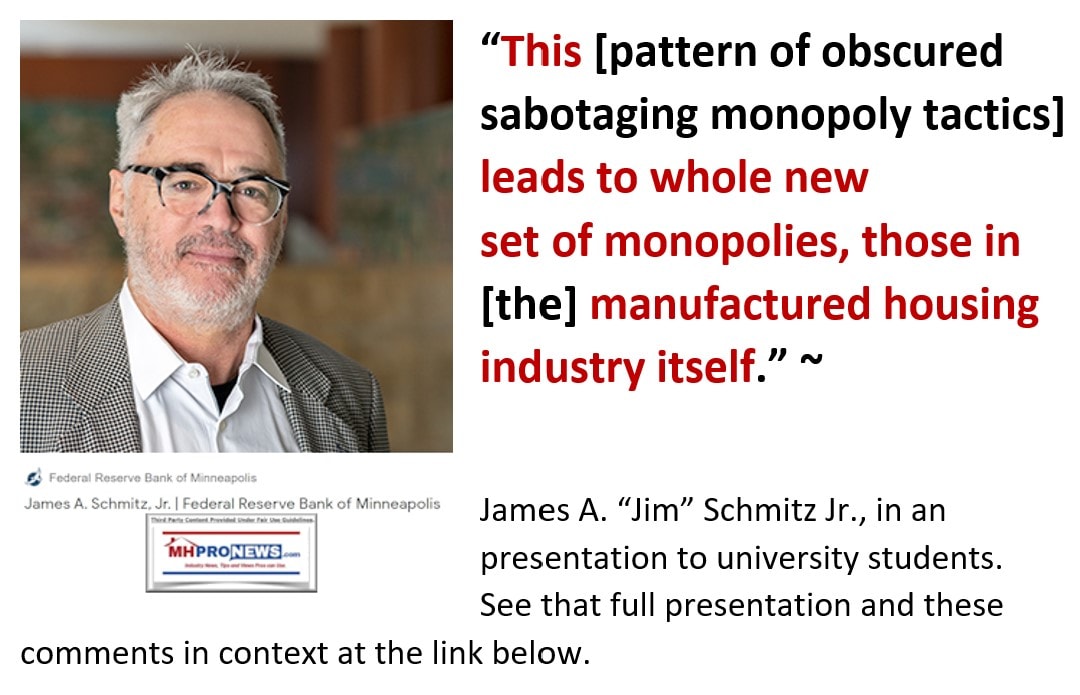
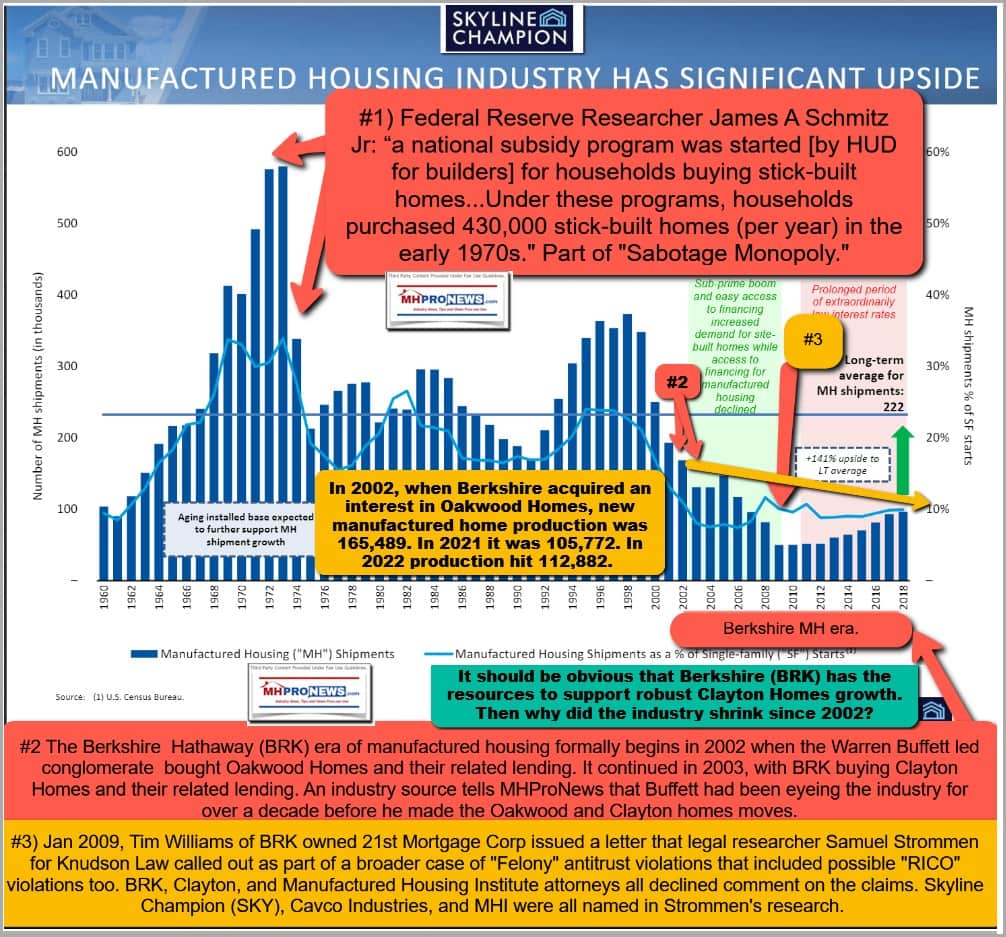
Postscript.
What is the point of all this sly industry underperformance? Apparently, consolidation. Flagship, Cavco, Skyline Champion, and other MHI members have said so in their own words. So, while MHI apparently pretends to be working to grow the industry, they are instead subverting it so their dominating brands can consolidate a ‘fragmented’ industry. How could they fix it? They could make a start by killing through litigation the DOE energy rule. They could launch, with the TMHA, litigation to get the Duty to Serve manufactured housing and federal enhanced preemption under the MHIA enforced. Failure to do so opens the door to potentially more legal woes for those involved. Yes, ESG can distort markets, as MHProNews has previously reported several times. But material omissions and misleading remarks can too, per the SEC. These latest remarks by Boor may leave several involved at MHI in a difficult position. But it would be no surprise if they simply go on posturing, because that is how con artists’ work. Never give up the con. ###
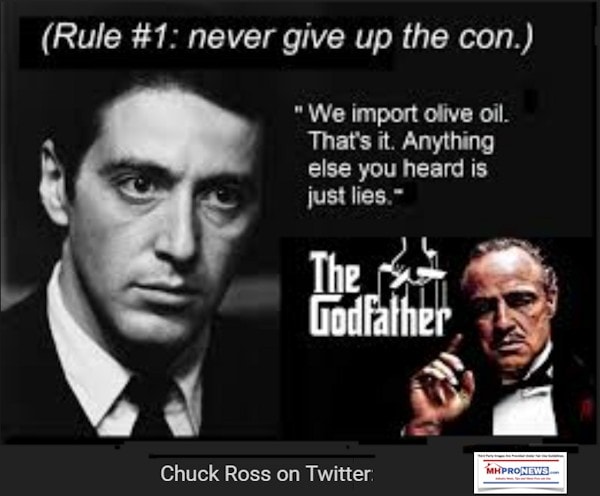
Notice: the graphic below can be expanded to a larger size.
See the instructions below the graphic below or click the image and follow the prompts.
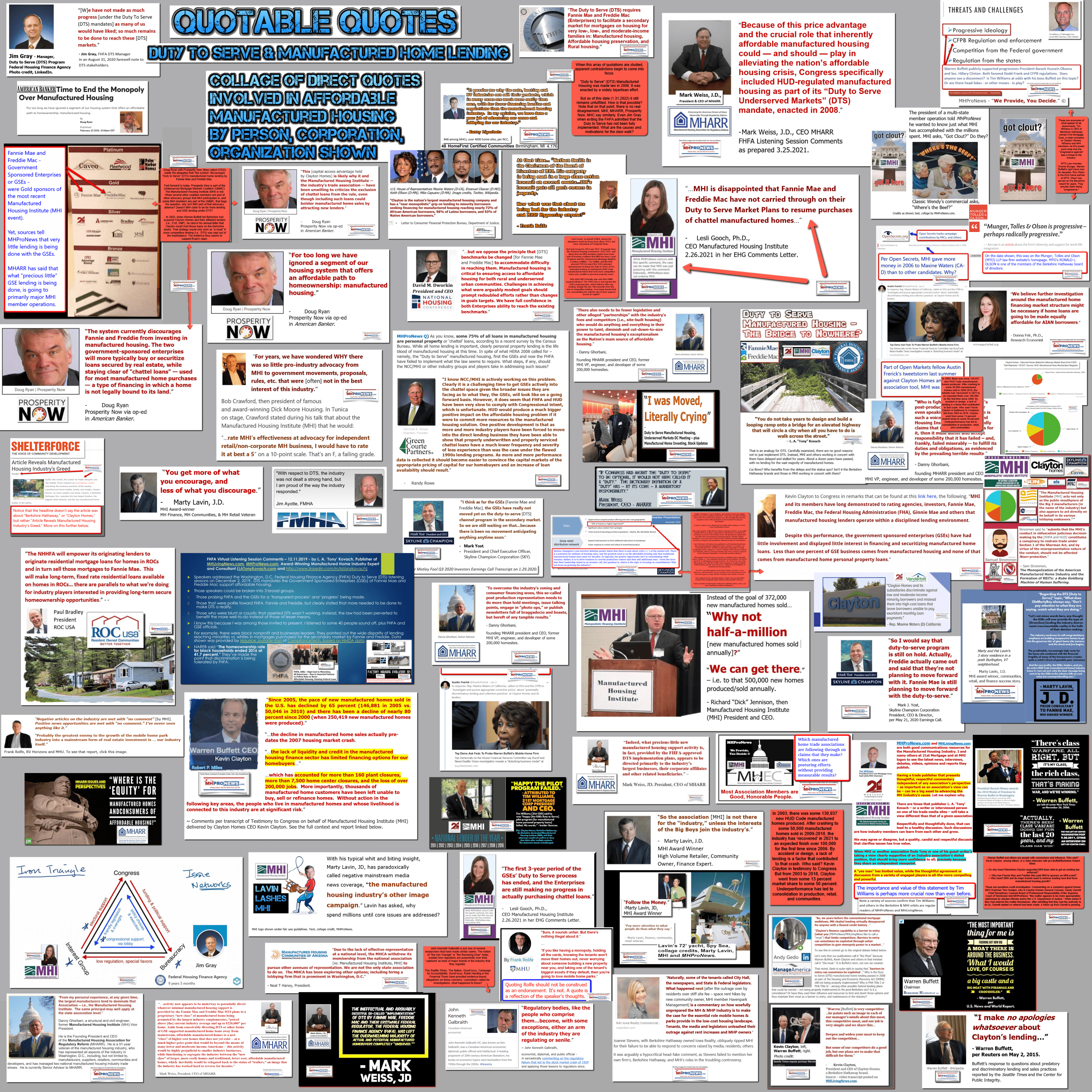

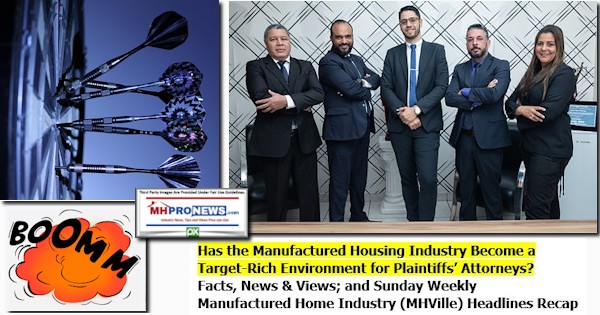

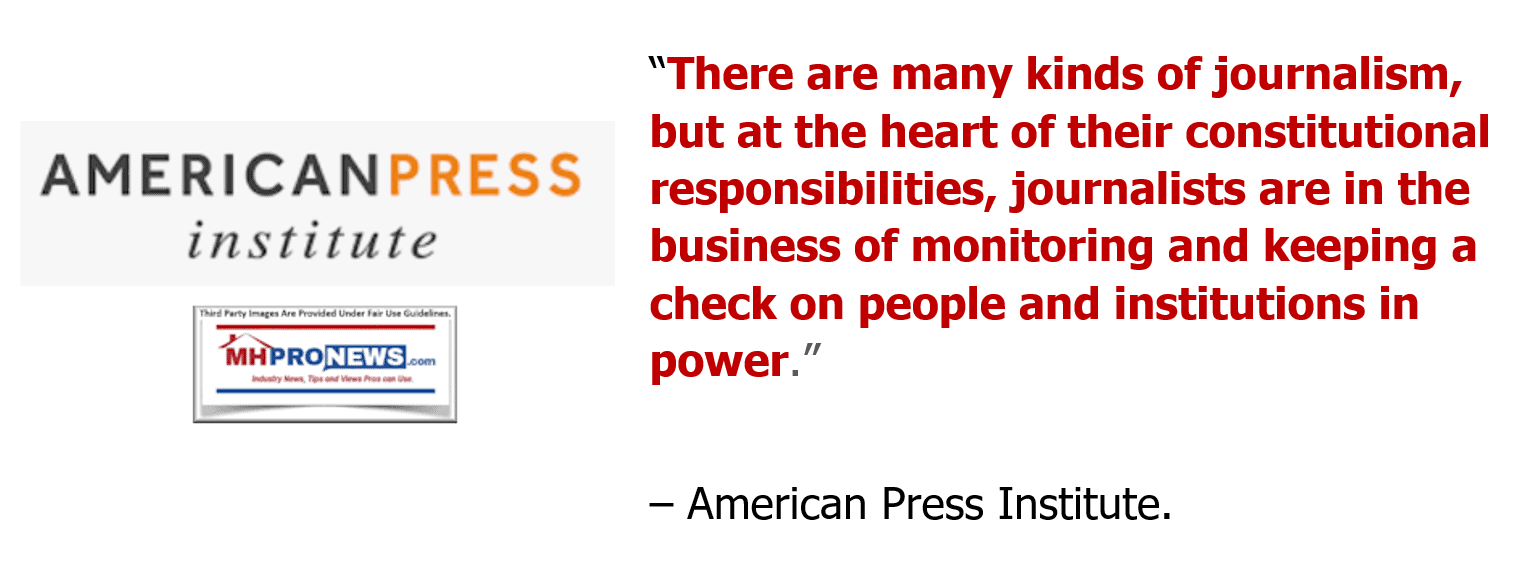


Again, our thanks to free email subscribers and all readers like you, as well as our tipsters/sources, sponsors and God for making and keeping us the runaway number one source for authentic “News through the lens of manufactured homes and factory-built housing” © where “We Provide, You Decide.” © ## (Affordable housing, manufactured homes, reports, fact-checks, analysis, and commentary. Third-party images or content are provided under fair use guidelines for media.) See Related Reports, further below. Text/image boxes often are hot-linked to other reports that can be access by clicking on them.)

By L.A. “Tony” Kovach – for MHProNews.com.
Tony earned a journalism scholarship and earned numerous awards in history and in manufactured housing.
For example, he earned the prestigious Lottinville Award in history from the University of Oklahoma, where he studied history and business management. He’s a managing member and co-founder of LifeStyle Factory Homes, LLC, the parent company to MHProNews, and MHLivingNews.com.
This article reflects the LLC’s and/or the writer’s position and may or may not reflect the views of sponsors or supporters.
Connect on LinkedIn: http://www.linkedin.com/in/latonykovach
Related References:
The text/image boxes below are linked to other reports, which can be accessed by clicking on them.’
